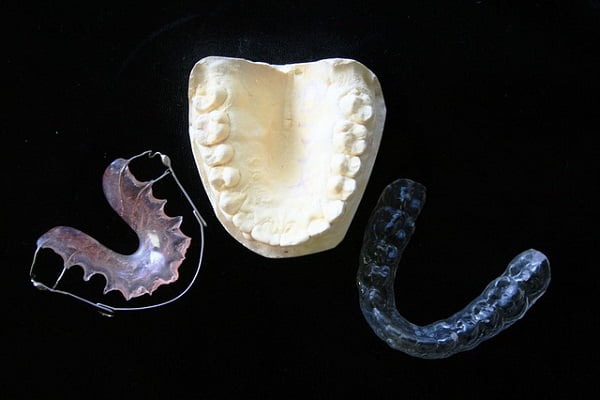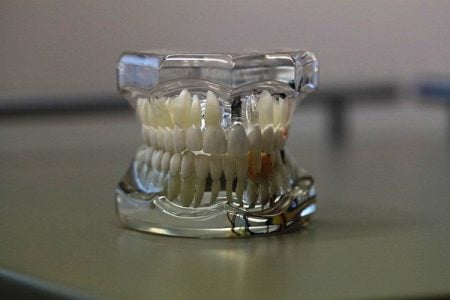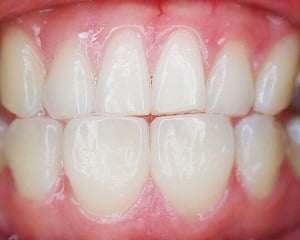Mouth Guard and its Benefits
- Updated on: Jul 13, 2024
- 5 min Read
- Published on Apr 22, 2021


What are dental guards or mouth guards or night guards?
Mouth guards are coverings that can be worn over teeth to protect teeth from injury from certain conditions or habits such as teeth grinding and during sports.
These are also sometimes called dental guards or teeth guards or night guards (if the objective is to protect teeth from teeth grinding during sleep, in particular).
The main function of a night guard or a mouth guard is to prevent the surfaces of your teeth from grinding together, causing you to chip and crack your teeth, which can strain your jaw muscles and cause tooth decay.
See also: Bruxism (Teeth Grinding or Jaw Clinching): Causes, Symptoms, Prevention, and Treatment
What are the types of teeth guards or mouth guards?
There are mainly three types of teeth guards, as follows:
Stock mouth protectors
Stock mouth protectors are ready to wear mouth guards. They are not too costly and can be bought at most sporting good stores or department stores. They are however bulky and make you uncomfortable. You can feel trouble in breathing and talking. And, they also do not they provide much protection to the teeth or mouth. Most dentists do not recommend them.
Boil and bite mouth protectors
Boil and bite mouth protectors are also available at most sporting goods stores and department stores. They generally are more effective than stock mouth protectors and you can get a better fit with these mouth protectors.
The “boil and bite” mouth guard is made of thermoplastic material. It is first placed in hot water to soften. Then, the guard is placed in the mouth to shape it around the teeth by applying a slight pressure with your fingers and tongue. But it also does not give a perfect custom shape to your teeth.
Custom-fitted mouth protectors
Custom-fitted mouth guards or teeth guards are designed for individual cases. These are developed in a dental office based on your dentist’s instructions to get a custom shape of the guard according to the structure and design of your teeth.
First, your doctor will take an impression of the teeth. A mouth guard is then molded over the model with a soft material that can be molded easily. This custom-made mouth guard is much more expensive than other types of teeth guards, but it provides the most comfort and protection to your teeth from teeth grinding (bruxism) or sporting injuries.
Generally, most teeth guards cover your upper teeth only, but in some cases, your dentist may make a mouth guard for the lower teeth as well, as needed. Your dentist can suggest the best teeth guard for you.
A good and effective mouth guard is comfortable, resistant to tears, durable and easy to clean, and should not restrict your breathing or speech.
More: Signs and Symptoms of Dental Caries (Dental Cavities or Tooth Decay)
More: Causes and Treatment for Supernumerary Teeth (Hyperdontia)
Do I need a night guard? Who needs a teeth guard?
a dull headache or tooth pain, you may want to ask a qualified dental professional
If you are suffering with a condition called bruxism, you may need a teeth guard or a night guard for teeth grinding. Bruxism, also called teeth grinding, affects more than 10 percent of people, according to the American Dental Association (ADA).
There are ways you can recognize whether you are suffering with teeth grinding, such as:
- Ask your parent, partner or family member or friend who sleeps with or nearby you if you grind teeth during sleep
- If you woke up with a sore jaw, there are chances that you grind teeth in the sleep
- A dull headache may be indicative of teeth grinding
- Tooth pain when you wake up can indicate grinding or related problems
There are several ways to alleviate the effects of teeth grinding. One of the most common, which your dentist may recommend, is a night guard or a dental guard for teeth grinding.
You will be required to wear it while sleeping through the night. It is mostly available without a prescription at most pharmacies as an over-the-counter device. To use the appliance, you simply boil it to soften it, cool it for a few seconds and then gently bite into it to shape it to your own teeth. Custom-made mouth guards as discussed above can also be used.
Night guards can also be purchased through your dentist. These are usually of higher quality and are expensive. They are made in a special laboratory from an impression of your mouth carefully taken by a professional under instructions of a dentist or by a dentist himself/herself.
Can I wear a mouth guard or a night guard if I wear teeth braces?
Yes. You can always wear a night guard or a mouth guard with braces. An injury to your face could damage braces or other appliances in the mouth, therefore a mouth guard may be particularly important for people who wear braces.
Talk to your doctor or orthodontist to determine which mouth guard can provide you the best protection for your unique mouth and teeth structures.
How do I care for my mouth guard and night guard?
These are simple guideline and tips you can follow to take care of your night guards and mouth guards:
- Rinse your mouth guard with water or with a mouth rinse before and after use of the guard every time
- Clean your mouth guard in cool, soapy water and rinse it well.
- Place the mouth guard in a container to keep it safe from damage. If the container has holes to permits air circulation, it is much better as it will help prevent developing the smell and also save it from damage.
- If your mouth guard is acrylic, keep it in fresh clean water.
- Protect the mouth guard from high temperatures. Do not keep it in hot water, in touch with hot surfaces, or under direct sunlight. This can otherwise distort its shape as they are made of soft material.
- Check your mouth guard and night guard regularly for general wear and tear or scratches. If you find tears in it, replace it.
- If the night guard or mouth guard becomes loose or causes discomfort, either replace it or get it tightened by your dentist. Some guards have springs in them to tighten or loosen them for better fitting over use.
- Bring the mouth guard to the dental visit in every scheduled visit for him or her to check it.
Night guard cleaner: How do you clean a mouth guard?
You can also clean your night guard or mouth guard with a night guard cleaner or mouth guard cleaner and a toothbrush.
Special tablets are also available that can help you clean the guard better. You just need to dissolve a tablet of the night guard cleaner in water and keep your night guard in the cleaner for about 15 minutes. Then, wash it in simple water and it is ready to use again.
Another way to deep clean your night guard is by using a mixture of vinegar and hydrogen peroxide. Soak your night guard in vinegar for about 20-30 minutes. Then, rinse the night guard with water. Then soak the night guard in hydrogen peroxide for about 30 minutes.












